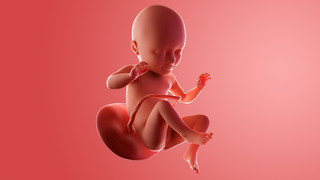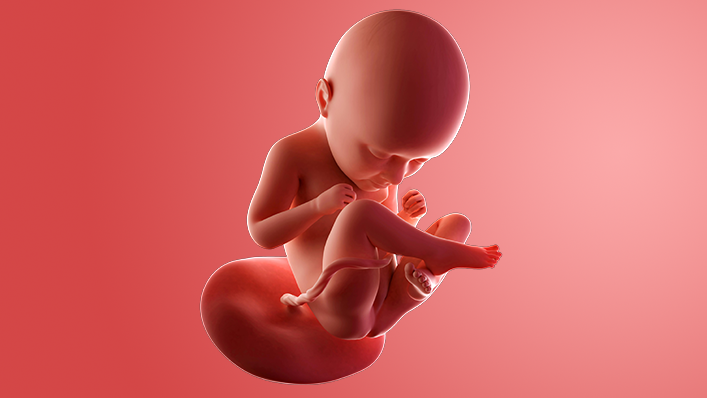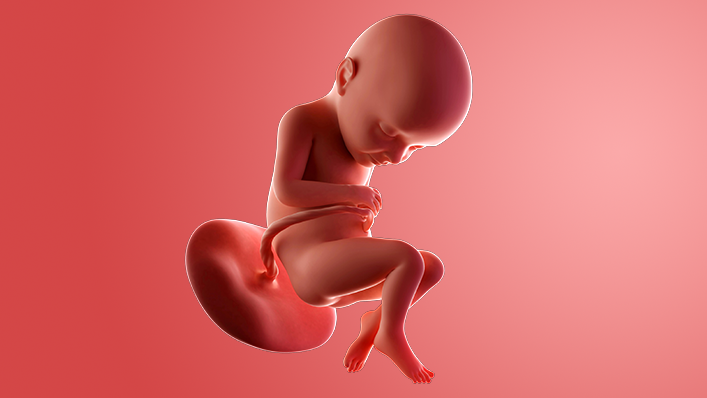What's happening in my body?
Your uterus (womb) could start preparing for the birth with Braxton Hicks contractions, which are sometimes referred to as practice contractions.
These can feel like a tightening over your bump for 20 to 30 seconds, before the muscles relax again.
It shouldn't hurt, but if the contractions become painful or begin to happen at regular intervals, contact your midwife or hospital, in case you're going into labour.
RSV vaccination
Have you had the RSV (respiratory syncytial virus) vaccine? It's usually offered at around week 28 but can be given later if needed, right up until you go into labour.
Having the vaccination can lower your baby's risk of a severe lung infection called bronchiolitis, which can make it difficult for your baby to breathe and feed. If you've not had it yet, speak to your midwife or a GP.
Preparing for the birth
Babies do things in their own time, and only 1 in 20 will arrive on their due date.
It might be a good idea to get a bag packed now, so that you're all ready to go if your baby decides to make an early appearance.
Get the following things ready:
- your birth plan and hospital notes
- clothes and nappies for the baby
- something loose and comfy to wear during labour
- spare clothes and underwear
- nightclothes
- nursing bras and breast pads
- super absorbent sanitary pads
- a wash bag and towels
- healthy snacks
- any medicines
See what else you should take with our hospital bag checklist.
Group B strep
Group B strep is a common bacteria, which up to 2 in 5 people have living in their body.
If you carry group B strep while you're pregnant, there's a small risk it could make your baby seriously ill. Most group B strep infections in newborn babies are preventable.
For more information talk to your midwife, or visit the Group B Strep Support website.
Getting in touch with people when you're in labour
If you're giving birth at a hospital or midwifery unit, then you're going to need to make a couple of phone calls when you go into labour.
Make sure you've got the following information stored in your mobile phone:
- a contact number for your midwife or hospital
- your hospital reference number (if you have one) – you may be asked for this when you phone
- a contact number for your partner or birth partner
- the full address of where you're going, in case you go blank when the time comes
- a taxi firm or contact number for someone who'll take you there – as it's not safe to drive yourself
You could also write this information down, and keep it in your bag, just in case your phone runs out of battery.
Keep some change handy too, in case you need to use the payphone.
3rd trimester pregnancy symptoms (at 33 weeks)
You may start to feel like something's weighing down on your pelvis. This heavy feeling can be a sign that your baby is in the head down position, ready for birth.
Your signs of pregnancy could also include:
- painless contractions around your bump, known as Braxton Hicks contractions
- sleeping problems (week 19 has information on feeling tired)
- stretch marks (week 17 has information on stretch marks)
- swollen and bleeding gums (week 13 has information on gum health during pregnancy)
- pains on the side of your baby bump, caused by your expanding womb ("round ligament pains")
- piles (week 22 has information on piles)
- headaches (read about headaches in pregnancy on NHS.uk)
- backache
- indigestion and heartburn (week 25 has information on digestive problems)
- bloating and constipation (week 10 has information on bloating)
- leg cramps (week 20 has information on how to deal with cramp)
- feeling hot
- dizziness
- swollen hands and feet
- urine infections
- vaginal infections (week 15 has information on vaginal health)
- darkened skin on your face or brown patches – this is known as chloasma or the "mask of pregnancy"
- greasier, spotty skin
- thicker and shinier hair
You may also experience symptoms from earlier weeks, such as:
- mood swings (week 8 has information on mood swings)
- morning sickness (week 6 has information on dealing with morning sickness)
- weird pregnancy cravings (week 5 has information on pregnancy cravings)
- a heightened sense of smell
- sore or leaky breasts (week 14 has information on breast pain) – a white milky pregnancy discharge from your vagina and light spotting (seek medical advice for any bleeding)
What does my baby look like?
Your baby, or foetus, is around 43.7cm long from head to heel. That's approximately the size of a pineapple.
Your baby's brain and nervous system are now fully developed.
The bones are hardening up, apart from the skull bones, which will stay soft and separated until the baby's around 12 to 18 months old. Having this slight flexibility with the head makes the journey down the birth canal a bit easier.

Action stations
Have you thought about how you're going to bring your baby home?
You'll need a car seat. Ideally you should buy a new one, so you'll know for sure that it has never been damaged before.
It's far too dangerous to carry the baby in your arms, and it is also illegal.
Car seats can be fiddly to start with, so practise strapping it into place, and then removing it.
The NHS website has more tips on what to buy for your baby.
This week you could also...
More in week-by-week

Week 34
You will have a week 34 antenatal appointment this week.
More in week-by-week guide to pregnancy


